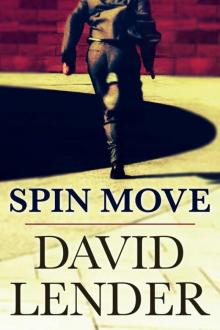- Home
- David Lender
Spin Move Page 12
Spin Move Read online
Page 12
“Your house burned down?”
“Yeah. I didn’t really have a choice. I put a dead backup battery on my alarm system before I left the house, so when the power went off the alarm wouldn’t work. The insurance company found out the alarm company’s software detected the battery switch ten hours before the fire. Now the Antiguan police are reopening their investigation because they suspect I may have conspired with the guy they nailed for torching my house. The insurance company won’t pay until it’s resolved.”
Katie shook her head. “So you conspired with the guy?”
“No. I did it myself.”
Katie felt a wave of unease. “All the more reason we need to look sharp here. And I think you underestimate Ducasse. I don’t. We need to act as if we’re dealing with people who are as smart as us on the other side.”
“That’s the way I’ve approached this whole thing.”
Katie said, “Well, if I were Ducasse, I wouldn’t buy what I saw today. And we go live tomorrow, our only shot at this.”
Ducasse and his entourage arrived late that night, so Rudiger, Katie and Daddy didn’t meet them until they all had breakfast the next morning. The staff at the Royal Hotel pushed together a group of tables for ten in the main dining room. Ducasse introduced his team: two associates from his firm, a partner and two associates from his Swiss law firm and a propylene industry consultant. Katie noticed that Rudiger didn’t flinch when the industry consultant was introduced to him, but she felt a stab of anxiety.
The man better be an idiot.
Ducasse and his people in two Range Rovers followed Rudiger, Katie and Daddy in their minivan out of town into the desert. As they approached the site, Katie could hear the sounds of heavy equipment from a quarter mile away. When they got closer she heard saws, grinders and hammers as well.
They started up the final hill and Rudiger picked up his iPhone to make a call. “Okay, Mec, now,” he said.
A few moments later a huge dump truck roared toward them, passed and headed off into the desert in the opposite direction. Katie looked over and saw Rudiger grinning.
As they rode over the crest of the final hill, she could hardly believe what she saw. A phalanx of 20 to 30 Range Rovers and Jeeps were parked in a semicircle off to one side of the two tents. About 30 people in suits were milling in and out of the main tent, and men in work uniforms and hard hats walked in and out of the smaller tent.
Three large caterpillars on tracks moved around inside the site, pulling over pieces of the rusting equipment. Foremen in hard hats directed teams of laborers who were using acetylene torches, saws, grinders and sledgehammers to cut up the debris. Other foremen directed teams that lugged the broken pieces into piles that two front loaders were lifting into dump trucks. Five more dump trucks were lined up behind them, waiting.
Mec stood outside the main tent wearing his uniform and observed as Rudiger and the other vehicles approached. He held up his hand to stop them, no-nonsense authority in his eyes, then waved to the left for them to park. His men were again lined up in a row for about 100 yards of the chain-link fence in front of the site. Another dump truck full of debris rumbled through the open gates and passed them as they parked the minivan.
“That’s a helluva show,” Katie said.
“Worth every penny.”
They all piled out of their vehicles and Rudiger handled the introductions, then herded everyone toward the main tent. Katie couldn’t help but smile. Not only was the demolition site abuzz, so was the main tent. At least 30 suits were in the tent, all actors hired and rehearsed by Michel Baptiste—some playing the role of company management, some their lawyers, some their bankers, some their bankers’ lawyers and some the project engineers. Most were seated in rows of chairs waiting for the presentation, many milling around, drinking tea or coffee and talking. An 8' x 10' artist’s rendering of the completed propylene plant stood on an easel in the front of the room off to one side. The catering table on the right was lined with breakfast snacks—fruit, croissants, bagels and accompaniments, Danish—coffee, tea and other beverages. The table on the left had piles of bound copies of the PowerPoint presentation, the Private Placement Memorandum, the business plan and draft copies of a purchase agreement, financing documents and the other legal documents. Two-inch-thick copies of engineering plans with a stack of folded copies of blueprints sat next to them.
Katie felt a swell of energy as Rudiger, looking resplendent in a navy suit, strode to the front of the room, stepped to the podium and said into the microphone, “Good morning, everyone. I’m John Rudiger of John Rudiger Enterprises, Inc., the equity sponsor of this project. Welcome today to all of you from Banque d’affaires Ducasse and advisors as potential participants in this transaction. With us today from our management team are Dorian Marchand, who’ll serve as CEO of the company, and Christophe Renaud, who’ll be CFO. We have representatives of the newly established Moroccan office of our law firm, Barnard, Montigny and Pineau, based in Paris, with offices in London and Milan.” About six people stood up and turned around, nodded.
Rudiger continued with the introductions of Tepper & Wilbanks, their engineering firm, six bankers from BNP Paribas in Paris who were proposing to do the construction financing, three bankers from Bank of America Merrill Lynch in London, who were contemplating providing the secured project financing once the facility was in place. Both banks had a group of lawyers. After he finished he invited Ducasse to introduce his team. Ducasse stepped to the podium and had each individual introduce him- or herself by name and state their position with their firm. After that, Rudiger stepped back up and introduced the CEO and CFO, who started their 35-slide PowerPoint presentation. Questions and answers at the end were lively. There were moments when Katie thought she was watching a movie, including jokes followed by strategic bursts of laughter that were baked into the script, and a few spontaneous ones she didn’t recognize from the prior day. Katie tensed as Ducasse’s industry expert, a German named Schoenfeld, stood up and asked a few tough questions that Marchand handled. Then Schoenfeld said, “Allow me to give a summary of my understanding of your profit thesis. Number one, propylene production from heavy feed crackers is uneconomic today.”
Marchand nodded his agreement.
“Number two, low natural gas prices provide downward pressure on propane prices as a feedstock.”
Marchand nodded again.
“Number three, higher oil prices are driving a higher propane-to-propylene spread, which in turn will maintain a high EBITDA margin for years.”
Marchand stepped to the microphone and said, “Exactly. Add to that the facts that conventional propylene production capacity has recently been significantly reduced and that propylene demand is in brisk recovery. It all spells a recipe for record high propylene prices and a record high propane-to-propylene spread.”
Schoenfeld continued to stand. He said, “Yes, but what about the fact that JP Propylene has recently finished plans for a 1.8 billion pounds per year propylene plant, 50% larger than what you propose, located on the northern coast of Algeria? It would have strategic access to Algerian natural gas and propane supply pipelines and Mediterranean port access to the same customers you propose in Europe, Africa and the Middle East.”
Marchand looked down at the podium as if studying his notes for a while. When he looked back up, Katie saw his eyes looked glassy. He cleared his throat.
At that moment Rudiger stood up on the aisle and said, “Perhaps I should answer that, since that’s been a factor in my firm’s decision to go forward with this project.” He walked to the front, said to Marchand, “Thanks, Dorian,” and stepped in front of the microphone. “There are two major reasons we don’t think that’s a concern. First, JP Propylene is relying on some of the same potential investors that we are, and we have the advantage of first mover status in locking down investment capital to preempt JP Propylene. Second, we’re well out in
front of them. We can get up and running about two years before they can. JP Propylene proposes a greenfield plant on a de novo site. As you know, we’re retrofitting a former refinery site, which gives us a host of advantages: existing infrastructure such as roads, electric, water, pipelines, etcetera, to jump-start the project and make it about 30% cheaper than a greenfield plant. As you may have noticed behind me”—and Rudiger turned his head as if to look at the site through the back of the tent, at which point a loud crash from the demolition resounded—“and may have heard”—and a rumble of laughter went through the room—“my firm elected not to wait for all the capital to be in place to commence demolition so we could move the project along. We’ve funded the initial efforts entirely ourselves, and we believe that could give us as much as an additional six months of lead time over JP Propylene.
“In addition, with our first mover status, we’ll have already locked in strategic customer relationships. As such, we believe that JP Propylene will determine that there will be reduced demand for their product. Their math won’t work for their required return on investment and their Algerian plant will never be built.
“I should add that I’m aware, confidentially, that JP Propylene is considering another plant on the Saudi peninsula in a joint venture with Saudi Aramco that would service the Middle East and Far East. And yet they only have management resources and funds available to build either the Algerian or the Saudi plant. So we’re convinced we’ll be the determining factor in assuring that their plant will get built in Saudi Arabia instead of Algeria.”
Schoenfeld hesitated for a moment, then nodded and sat back down.
After the presentation Rudiger found Katie, Schoenfeld and Ducasse standing together and talking.
Schoenfeld said to Rudiger, “Interesting insight into the JP Propylene situation. I was completely unaware of the proposed Saudi plant.”
Rudiger said, “Please don’t tell anyone where you heard it, since my source would be very embarrassed if it got out.”
Ducasse said, “Angela was just telling me that she’s considering an investment directly in the project.”
Rudiger smiled. “Yes, but she’s been very coy about how much.”
Katie smirked at him.
Ducasse said, “And I was surprised to see the activity on the site when we arrived. I had no idea you were commencing operations.”
“Like I said up there just now, I intend to strike while the iron is hot.”
Katie saw Daddy wave them over to where he was sitting near the back of the tent. Rudiger said to Ducasse, “Philippe, I introduced you to Carter Bowles, the man who sold us the property, at breakfast, but from where you were seated you didn’t have much opportunity to speak with him. He’s over there.” Katie and Rudiger walked Ducasse over to Daddy.
Daddy, looking dignified in a suit with a string cowboy tie, said to Rudiger, “You know, John, I hadn’t seen all this material before. This old cowboy is having second thoughts about selling.” Katie felt a jolt of alarm. She darted a look at Rudiger, whose face was expressionless.
Daddy said, “This project is much more attractive than I had realized. Would you consider not paying off the note 100% and letting me roll some of the principal into the new project?”
Rudiger said, “That’s an interesting idea, Carter, but I’m not sure there will be room in the deal.” He looked at Ducasse.
Ducasse said, “Yes, I believe the deal will be fully subscribed, and you’ve already sold the property, have you not, Mr. Bowles?”
Daddy pursed his lips and shrugged. Katie had to stifle a grin.
On the way back to the city an hour later, Katie turned to see Daddy snoozing in the back of the minivan. She said to Rudiger, “Was that little ditty with my father something the two of you scripted at the last minute? It gave me a scare.”
“No, that was pure ad-lib by your dad. I think he’s been watching too many old episodes of Dallas.” Rudiger laughed.
“And what about your response to Schoenfeld’s question on JP Propylene?”
“That was a Hail Mary, pure fiction. But it looks like it worked.”
They were in Daddy’s room fixing drinks at five o’clock when Rudiger’s phone rang. He answered it, listened for a moment, then smiled and said, “That’s great news, Philippe, I’ll be happy to have you on board. Let’s sit down together and work it out tomorrow.” He hung up. “That was Ducasse. He’s in. He wants to fund the full $100 million of equity for the project.”
Katie kissed him, then Daddy. She said, “Champagne!”
Daddy said, “The hell with champagne, let’s get a bottle of Jameson’s.”
CHAPTER 6
That night Rudiger awakened to a sound he couldn’t identify. He sat up in bed, alarmed, looked to see Katie wasn’t in the bed, then heard her voice. “Breathe!” she said, “Breathe!” He felt a bolt of panic, jumped up and ran into the living room. He saw Katie standing over Frank through the doorway adjoining their rooms. Frank sat in his wheelchair, gasping for air, his eyes showing terror.
“What’s wrong?” Rudiger said.
“An attack,” Katie said, her voice urgent. “A bronchospasm, but he’s coming around.”
Katie held a rescue inhaler in Frank’s mouth, gave him another spray. “It’s okay, Daddy. It’s passing.”
Frank’s breathing slowed, his eyes closed and he nodded to her. Katie waved Rudiger off, and he went back to bed. A half hour later Katie came to bed.
“He’s sleeping, breathing normally,” she said.
“Has that happened before?”
“A few times in the last year. Dr. Dewanji says it comes on after a very stressful day or if he gets overly excited. Today may have been too much for him.”
“What was that inhaler?”
“A bronchodilator. Relaxes and opens the airways.”
“Maybe you should show me where you keep it, just in case he has another attack and you aren’t around.”
Katie nodded. Rudiger could see she was still rattled. He put his arm around her and pulled her to him. She rested her head on his chest. She said, “It’s times like this I have to force myself to face the reality that he won’t be here forever.” A few moments later he felt her tears on his chest.
The team of six arrived shortly after dawn at Rabil Airport on a G650. Their man met them on the tarmac with two SUVs. Stevens, the team leader, waved his men into the SUVs and crackled them all on the radio.
“We’re five minutes away,” Stevens said. “I don’t see any reason to wait. The target site is isolated, no resistance or weapons expected, low probability of observers. We go in now. Jenkins is watch from the shore side, Golub from the beach. The rest of us go in and surround the house. Weapons live. Stone, Harris and Kaminsky, you are with me, shooters with your dart guns. The four of us go in, snatch-and-grab our two targets, then we’re out. Subdue any witnesses, but no terminations.”
Stevens waved Jenkins to start driving. He headed out on the main highway and within minutes found the turnoff for the long driveway into the target property. Hardscrabble volcanic rock and low-lying shrubs, reminding him of the plains in Afghanistan.
Stevens felt for the dart gun in the holster on his hip, fingered the M1A he held.
With any luck, they’d be in and out of here within half an hour, then drop their targets at the airport in Lisbon. From there the targets would be sent off to wherever. Stevens didn’t know and didn’t care. All that mattered was that this looked to be an easy job for once, then some R & R.
They bounced up the rocky road slowly enough to avoid raising too much sand and dust. As they approached the target location, he saw a huge satellite dish on the roof of the house. He motioned for Jenkins to stop, and the other SUV fell in behind. They all got out and moved forward, crouching over their M1As. When they got to the crest of the hill, Stevens waved them all onto the ground
and said into his radio, “Golub and Jenkins, use your binoculars. Golub, go around the house and report from the beach. Jenkins, get as close as you can from this side and tell us what you see.” Stevens noted that two SUVs were parked under the carport. He pulled his copy of the photos of the two targets from his pocket, a man and a woman.
Five minutes later Jenkins crackled the radio. “A woman moving around inside the kitchen. Can’t see her face but slight build, maybe 5'3" to 5'5". Looks like target one.”
A few minutes later Golub was on. “A man on the deck outside. Tall, maybe 6'2", dark hair. He just walked back inside.”
That was good enough for Stevens. He looked down at his other men lined on the hill, then waved “Go,” with two fingers. The other three of his men ran down and surrounded the house. Stevens trotted down the grade after them. When he reached the deck of the house facing the ocean, he saw the sliding doors on the ground floor were open. He clicked on the radio and said, “Okay, Stone, Harris and Kaminsky, with me now, we’re going in.” The men fell in behind him and the four of them entered the ground floor, weapons pointed. Just as they entered, a woman carrying a laundry basket reached the bottom of the stairs and started across the room. She saw them and dropped the basket, her eyes like saucers.
“Down, down, don’t move,” Stevens said. The woman fell to the floor facedown, her arms and legs outstretched. He didn’t need to look at the photo again to tell she wasn’t target one. Stevens ran to kneel next to her, motioned to his men, who entered the other rooms on the first floor.
“Where are they?” Stevens said.
“No home,” the woman said.
Stevens waited until his men came out of the rooms, shaking their heads, then immediately ordered them upstairs. He heard them walking around, checking rooms. His radio crackled. “Got the man, bringing him down.”

 Arab Summer
Arab Summer Sasha Returns
Sasha Returns Spin Move
Spin Move Bull Street (A White Collar Crime Thriller)
Bull Street (A White Collar Crime Thriller) Vaccine Nation
Vaccine Nation Trojan Horse
Trojan Horse